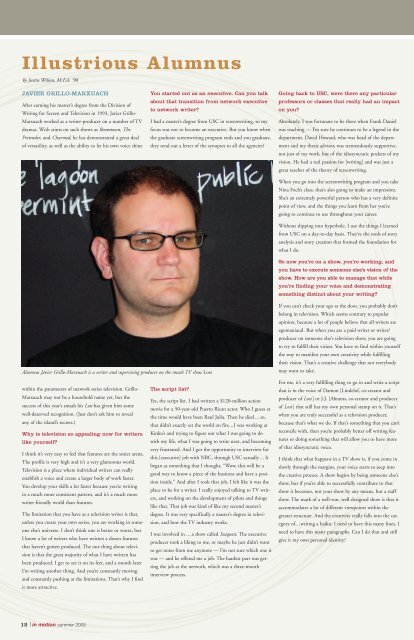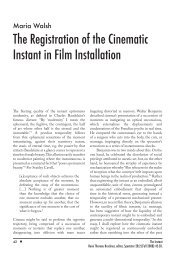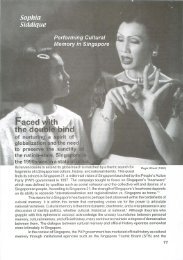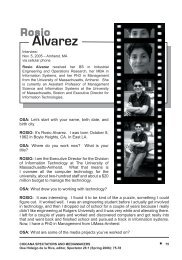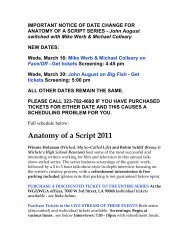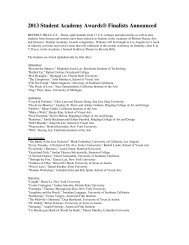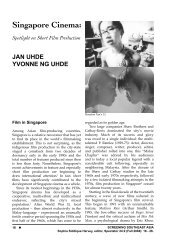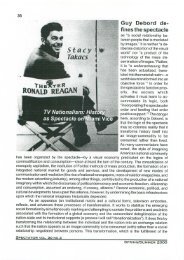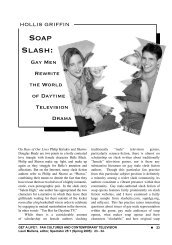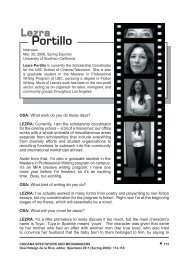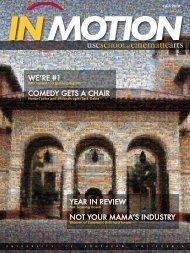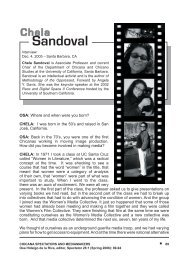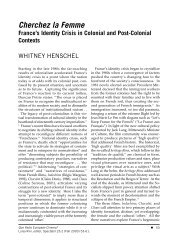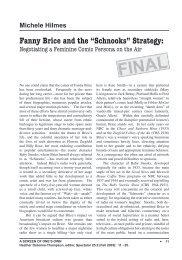IN MOTION (backup) V.3 - USC School of Cinematic Arts - University ...
IN MOTION (backup) V.3 - USC School of Cinematic Arts - University ...
IN MOTION (backup) V.3 - USC School of Cinematic Arts - University ...
Create successful ePaper yourself
Turn your PDF publications into a flip-book with our unique Google optimized e-Paper software.
Illustrious Alumnus<br />
by Justin Wilson, M.F.A. ’98<br />
JAVIER GRILLO-MARXUACH<br />
After earning his master’s degree from the Division <strong>of</strong><br />
Writing for Screen and Television in 1993, Javier Grillo-<br />
Marxuach worked as a writer-producer on a number <strong>of</strong> TV<br />
dramas. With stints on such shows as Boomtown, The<br />
Pretender, and Charmed, he has demonstrated a great deal<br />
<strong>of</strong> versatility, as well as the ability to let his own voice shine<br />
within the parameters <strong>of</strong> network series television. Grillo-<br />
Marxuach may not be a household name yet, but the<br />
success <strong>of</strong> this year’s smash hit Lost has given him some<br />
well-deserved recognition. (Just don’t ask him to reveal<br />
any <strong>of</strong> the island’s secrets.)<br />
Why is television so appealing now for writers<br />
like yourself?<br />
I think it’s very easy to feel that features are the sexier arena.<br />
The pr<strong>of</strong>ile is very high and it’s a very glamorous world.<br />
Television is a place where individual writers can really<br />
establish a voice and create a larger body <strong>of</strong> work faster.<br />
You develop your skills a lot faster because you’re writing<br />
in a much more consistent pattern, and it’s a much more<br />
writer-friendly world than features.<br />
The limitation that you have as a television writer is that,<br />
unless you create your own series, you are working in someone<br />
else’s universe. I don’t think one is better or worse, but<br />
I know a lot <strong>of</strong> writers who have written a dozen features<br />
that haven’t gotten produced. The one thing about television<br />
is that the great majority <strong>of</strong> what I have written has<br />
been produced. I get to see it on its feet, and a month later<br />
I’m writing another thing. And you’re constantly moving<br />
and constantly pushing at the limitations. That’s why I find<br />
it more attractive.<br />
You started out as an executive. Can you talk<br />
about that transition from network executive<br />
to network writer?<br />
I had a master’s degree from <strong>USC</strong> in screenwriting, so my<br />
focus was not to become an executive. But you know when<br />
the graduate screenwriting program ends and you graduate,<br />
they send out a letter <strong>of</strong> the synopses to all the agencies?<br />
Alumnus Javier Grillo-Marxuach is a writer and supervising producer on the smash TV show Lost<br />
12 | in motion summer 2005<br />
The script list?<br />
Yes, the script list. I had written a $120-million action<br />
movie for a 50-year-old Puerto Rican actor. Who I guess at<br />
the time would have been Raul Julia. Then he died…so,<br />
that didn’t exactly set the world on fire...I was working at<br />
Kinko’s and trying to figure out what I was going to do<br />
with my life, what I was going to write next, and becoming<br />
very frustrated. And I got the opportunity to interview for<br />
this [executive] job with NBC, through <strong>USC</strong> actually…It<br />
began as something that I thought, “Wow, this will be a<br />
good way to know a piece <strong>of</strong> the business and have a position<br />
inside.” And after I took that job, I felt like it was the<br />
place to be for a writer. I really enjoyed talking to TV writers,<br />
and working on the development <strong>of</strong> pilots and things<br />
like that. That job was kind <strong>of</strong> like my second master’s<br />
degree. It was very specifically a master’s degree in television,<br />
and how the TV industry works.<br />
I was involved in … a show called Seaquest. The executive<br />
producer took a liking to me, or maybe he just didn’t want<br />
to get notes from me anymore — I’m not sure which one it<br />
was — and he <strong>of</strong>fered me a job. The hardest part was getting<br />
the job at the network, which was a three-month<br />
interview process.<br />
Going back to <strong>USC</strong>, were there any particular<br />
pr<strong>of</strong>essors or classes that really had an impact<br />
on you?<br />
Absolutely. I was fortunate to be there when Frank Daniel<br />
was teaching — I’m sure he continues to be a legend in the<br />
department. David Howard, who was head <strong>of</strong> the department<br />
and my thesis advisor, was tremendously supportive,<br />
not just <strong>of</strong> my work, but <strong>of</strong> the idiosyncratic pockets <strong>of</strong> my<br />
vision. He had a real passion for [writing] and was just a<br />
great teacher <strong>of</strong> the theory <strong>of</strong> screenwriting.<br />
When you go into the screenwriting program and you take<br />
Nina Foch’s class, that’s also going to make an impression.<br />
She’s an extremely powerful person who has a very definite<br />
point <strong>of</strong> view, and the things you learn from her you’re<br />
going to continue to use throughout your career.<br />
Without slipping into hyperbole, I use the things I learned<br />
from <strong>USC</strong> on a day-to-day basis. They’re the tools <strong>of</strong> story<br />
analysis and story creation that formed the foundation for<br />
what I do.<br />
So now you’re on a show, you’re working, and<br />
you have to execute someone else’s vision <strong>of</strong> the<br />
show. How are you able to manage that while<br />
you’re finding your voice and demonstrating<br />
something distinct about your writing?<br />
If you can’t check your ego at the door, you probably don’t<br />
belong in television. Which seems contrary to popular<br />
opinion, because a lot <strong>of</strong> people believe that all writers are<br />
egomaniacal. But when you are a paid writer or writer/<br />
producer on someone else’s television show, you are going<br />
to try to fulfill their vision. You have to find within yourself<br />
the way to manifest your own creativity while fulfilling<br />
their vision. That’s a creative challenge that not everybody<br />
may want to take.<br />
For me, it’s a very fulfilling thing to go in and write a script<br />
that is in the voice <strong>of</strong> Damon [Lindel<strong>of</strong>, co-creator and<br />
producer <strong>of</strong> Lost ] or J.J. [Abrams, co-creator and producer<br />
<strong>of</strong> Lost ] that still has my own personal stamp on it. That’s<br />
when you are truly successful as a television producer,<br />
because that’s what we do. If that’s something that you can’t<br />
reconcile with, then you’re probably better <strong>of</strong>f writing features<br />
or doing something that will allow you to have more<br />
<strong>of</strong> that idiosyncratic voice.<br />
I think that what happens in a TV show is, if you come in<br />
slowly through the margins, your voice starts to seep into<br />
the creative process. A show begins by being someone else’s<br />
show, but if you’re able to successfully contribute to that<br />
show it becomes, not your show by any means, but a staff<br />
show. The mark <strong>of</strong> a well-run, well-designed show is that it<br />
accommodates a lot <strong>of</strong> different viewpoints within the<br />
greater structure. And the creativity really falls into the category<br />
<strong>of</strong>…writing a haiku: I need to have this many lines, I<br />
need to have this many paragraphs. Can I do that and still<br />
give it my own personal identity?


